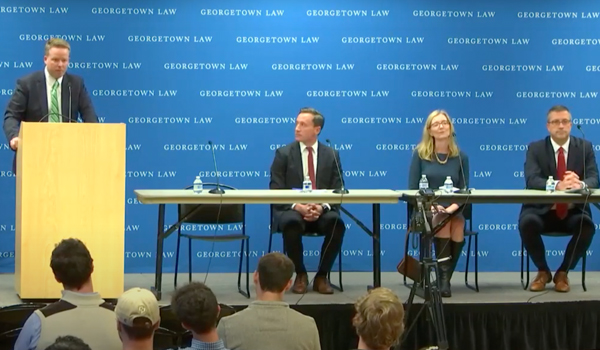 On the evening of October 13, Catholic Law’s Project on Constitutional Originalism and the Catholic Intellectual Tradition (CIT) and The Georgetown Center for the Constitution co-hosted a discussion held at Georgetown Law which centered on Professor Chad Squitieri's recent paper, "Towards Nondelegation Doctrines," The event can be viewed here.
On the evening of October 13, Catholic Law’s Project on Constitutional Originalism and the Catholic Intellectual Tradition (CIT) and The Georgetown Center for the Constitution co-hosted a discussion held at Georgetown Law which centered on Professor Chad Squitieri's recent paper, "Towards Nondelegation Doctrines," The event can be viewed here.
The conversation featured The Honorable Trevor McFadden, United States District Court for the District of Columbia, as moderator; Chad Squitieri, Assistant Professor of Law, Catholic Law; and Christine Chabot, Distinguished Professor in Residence, Loyola University Chicago School of Law, as panelists.
Randy E. Barnett, the Patrick Hotung Professor of Constitutional Law at Georgetown Law, opened the event with welcoming remarks. Kevin Walsh, co-director of CIT and professor of law at Catholic Law, also gave opening remarks following Barnett.
Walsh gave an overview of the Catholic intellectual tradition and its rich history and significance for philosophy, theology, and legal theory. Walsh also briefly mentioned the various programming offered by CIT, including the speakers program, the Aquinas Fellowship, the Junior Fellowship, and curricular offerings through Catholic Law.
Professor Squitieri shared his theory of developing multiple “power specific” nondelegation doctrines as an alternative to the currently accepted nondelegation doctrine. Squitieri noted, "My argument is that the Constitution is textually committed to a nondelegation principle. But this principle should be applied not through a single, one-size-fits all nondelegation doctrine. But should instead be applied through multiple, power-specific doctrines, each one corresponding to one of the unique powers vested in Congress." Professor Chabot responded by first commending Professor Squitieri for engaging with the text of the Constitution to add to nondelegation analyses. Chabot questions the ability for each legislative power in the Constitution to have a nondelegation doctrine applied or whether finding commonalities in the various delegated powers should instead be investigated to inform a new series of tests. Squitieri responds with an emphasis on the necessity to have the theory of multiple power-specific doctrines put into practice to guide the outcome.
The event is the fifth of CIT’s speakers events in the fall of 2022. Other events this fall include co-sponsorships with The American Enterprise Institute, The Center for the Study of Statesmanship, The Georgetown Center for the Constitution, The Institute for Human Ecology, and The Thomistic Institute. For more information about upcoming events, visit https://cit.catholic.edu/events/.
